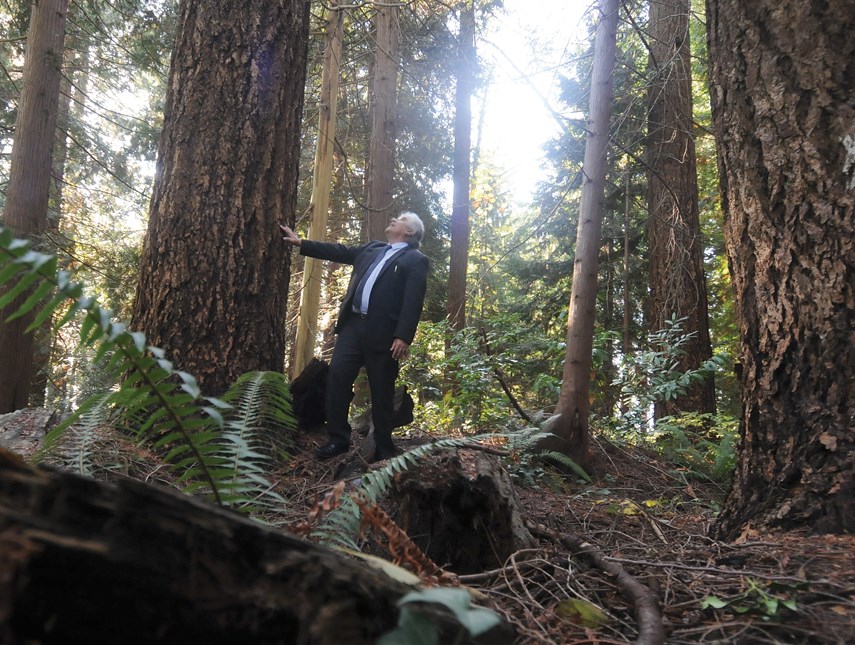The fate of West Vancouver’s Brissenden Park land now rests with the courts.
Lawyers for the District of West Vancouver were in B.C. Supreme Court Jan. 23 seeking permission to sell off a piece of land that had been donated to the district on the promise it would be made into a park.
Any money raised from the sale of the land at 2519 and 2539 Rosebery Ave. would be used to buy two properties on the Ambleside waterfront, which would be designated as a new park.
In 1990, Pearley and Norine Brissenden bequest their property to the district “to be used and maintained for public park use.” But the council of the day never followed through, and instead rented the Brissenden’s home to a caretaker.
In 2017, council resolved to apply to the courts to vary the trust in which the land was held, arguing the property was unsuitable for a park because it was too steep, and it lacked parking, transit access and amenities. When the Ministry of the Attorney General opposed the sale, council changed course and developed the northern section of the property into a park and changed their request to only sell the southern portion.
In court, district lawyer Paul Hildebrand argued various common law court decisions regarding trusts suggest the district does not even need the court’s permission to sell the land “provided that the proceeds are used in a manner consistent with the purpose of the trust.”
Should the Brissendens’ land be sold, the money would go towards the purchase of 1444 and 1448 Argyle Ave., which would then be renamed Brissenden Waterfront Park.
Trail counters in Brissenden Park only capture about six visitors per day, while the park on the waterfront would attract tens of thousands, Hildebrand said. And, he added, council’s plans have been supported in a consultation process led by the district.
“In a practical sense … it is truly a win-win, both for the district residents and with respect to the Brissenden name,” he said. “There may be cases where it is not possible to further both [the public interest and the interest of the trust] but there are cases where it is possible to respect both – and this case, a very high degree of effort has gone in making sure the purposes of the trust are respected.”
If the judge were to rule the district does need the court’s approval for the sale, then, Hildebrand argued, West Vancouver had amply demonstrated it was no longer in the community’s interest to keep the trust as it is.
“In terms of doing the right thing for the public, there’s simply no question West Vancouver has met the highest possible standard. Six months of public consultation, modifying their original plan and reflecting the ability to take a long-standing public effort to have a continuous strip along the waterfront, which is obviously a jewel in the crown of West Vancouver, but recently has become an expensive proposition,” he said.
But the lawyer for the attorney general, Sointula Kirkpatrick, asked the judge to consider West Vancouver’s conduct as a trustee before making a decision. The AG has a role to protect trusts but it shouldn’t be their job to police trustees, she said.
“It is the attorney general’s position that we have had to prompt West Van every step of the way since they filed their petition to do what they should have done 25 years ago,” she said.
The Brissendens consulted with West Vancouver council who in turn consulted with the parks department before mayor-Donald Lanskail wrote to the couple in 1987 to assure them their land would be a “treasured community asset,” Kirkpatrick noted.
When deciding whether to grant the variation on the trust, Kirkpatrick asked the judge to apply the “armchair rule” – that is, trying to put one’s self in the mind of the person as they sat in their armchair and contemplated their will.
Kirkpatrick drew special attention to Norine Brissenden’s request that, as her property was developed into a park, the “trees and natural growth be preserved as far as may be practical.”
“Mrs. Brissenden’s will is replete with specific requests,” she said, rattling off other items listed in the will. “You don’t even have to look at anything else. It’s site-specific park trust. She and her husband wanted their property to be a neighbourhood park and that’s clear. I’m not sure how much clearer she can say it.”
No date has been set for a decision in the case.



